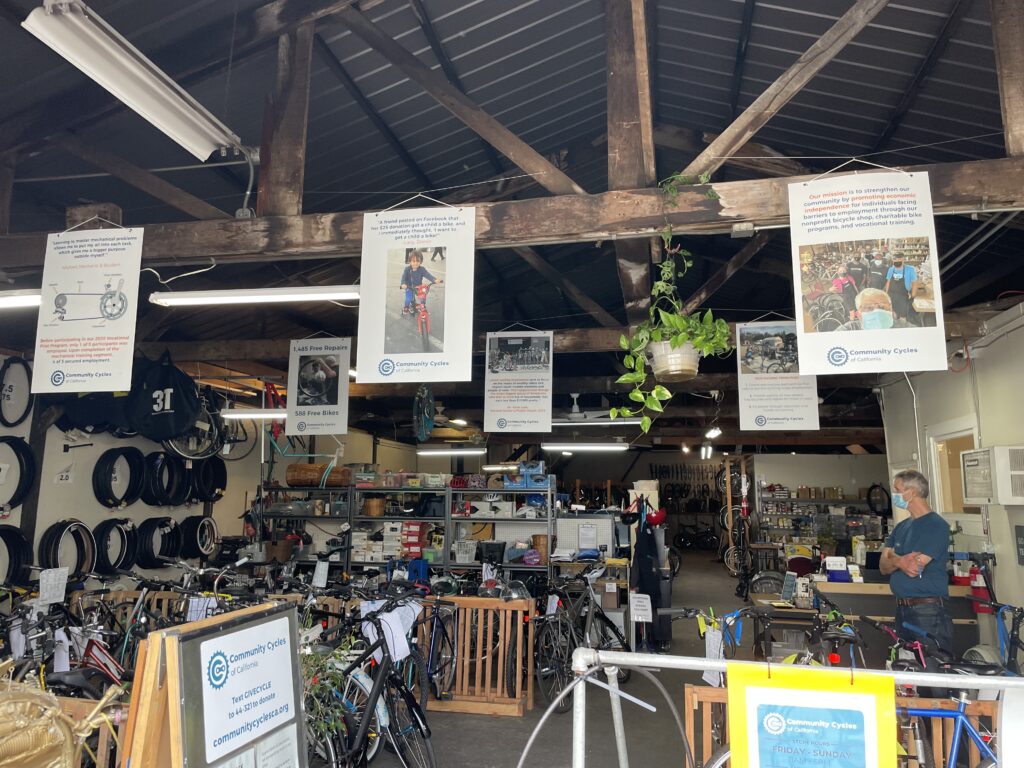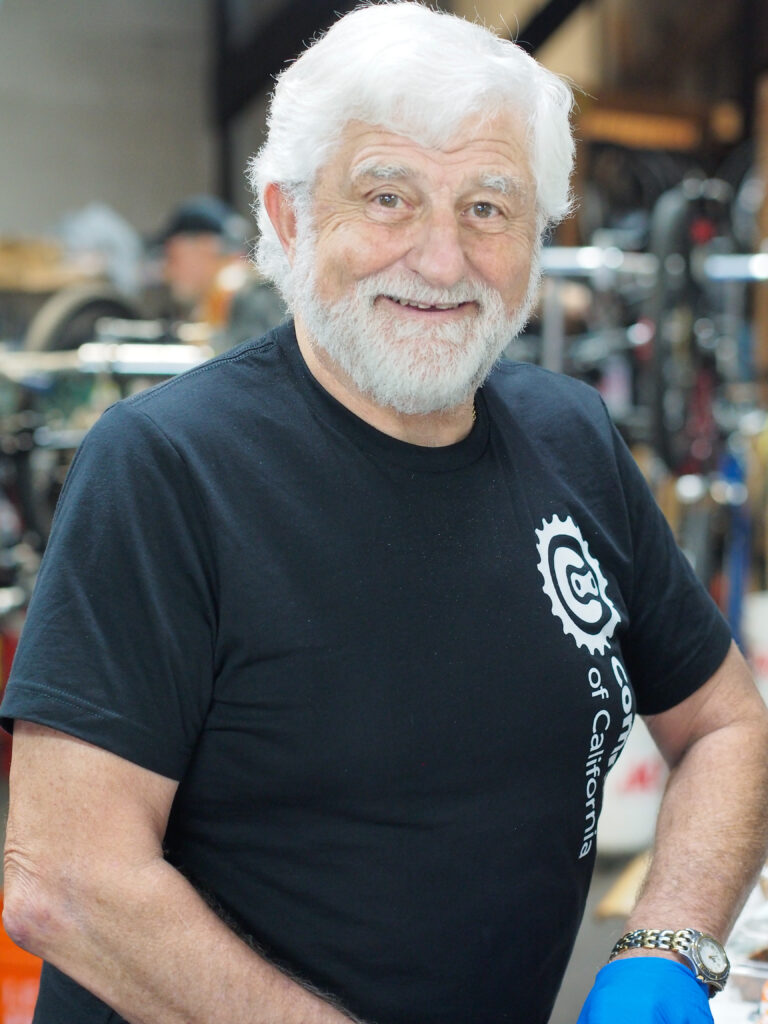
After being an executive in what he calls “the big nasty corporate world” of the Silicon Valley, Collin Bruce tried retirement. But it just didn’t work for him. He began an encore career by volunteering at different nonprofits and helping out at a nonprofit bike shop, then decided to create one of his own. And now, eight year later, Community Cycles of California is not only a successful bike shop but a training ground for those with barriers to employment who want to learn how to start their own business.
“The goal is to set up a workforce development environment,” Bruce ways. “We spent time establishing the bike shop so we’d have the classroom to teach people how to run a small business. We started in 2017 and finally got our first cohort last year.”
The organization now has seven paid employees and a substantial volunteer group, but Bruce is in charge of everything – making sure there’s revenue in the bike shop, managing the training program and bringing in instructors to run it.
The bike shop is self-sufficient and helps support the organization’s programs. Community Cycles participates in activities to create funding for its small business training ground. These activities include fixing bikes at Earth Day celebrations and other events where cities pay them to provide bike repairs. The nonprofit also does mobile bike clinics to ensure that people in homeless camps have working bicycles to ride.
Bike Maintenance and Retail Program had first cohort
A long-in-the-planning-stages endeavor known as the Bike Maintenance and Retail Program launched its first cohort last October. It consisted of 10 participants, seven of whom made it to the end. The six-month, 40-hours-per-week program was funded with a $300,000 grant from the Foundation for California Community Colleges. Additional support of $135,000 came from Rotary Club and several other sources.
The Bike Maintenance and Retail Program, pays participants $20+ per hour to participate and teaches them how to run a small business. They all had to have been justice-involved at some point during the previous five years.
And they had to have been referred by a community organization with a program that they already had participated in. “People in the first cohort were referred by other organizations. I struggled with partners to get the first cohort together, but now I’m up to 15 partners ready to supply people to come into the class,” Bruce says. These partners include Recovery Café San Jose and City Team.
During the first couple of weeks participants worked on social and emotional skills.
“They built up their code of conduct,” says Bruce. “Then we introduced how to fix a bike. The cohort members were also taught and trained on how to handle retail. During the second three months they were in the shop working as bike mechanics, doing retail sales and dealing with customers.”
Overall, they focused on mindset development, career readiness, digital literacy, and practical skills in bike repair and retail.

In addition, cohort members took external classes, including one from OSHA for safety training and another from the National Retail Foundation, which concentrated on the operation of and profit in a retail business. Bruce also incorporated courses from Santa Clara University’s My Own Business Institute and the Park Tool School, a maintenance and repair curriculum created by the company that is the leading supplier of tools to the bicycle industry.
The program also concentrated on the fundamentals of how to become a good employee, including such soft skills as time management and how to deal effectively with customers.
The teachers included Rotary Club members, employees of Community Cycles and other bike shops, and even one cohort member who taught the OSHA class, since he had been through advanced OSHA training.
Of the seven who completed the program, two were hired by Community Cycles, two have other jobs and the last three are working on interviewing skills, with one concentrating on getting his GED.
The bike shop that serves as the training ground sells donated refurbished bikes. “We get thousands every year,” Bruce says. “The general public, Google and Apple have been suppliers in the past. The Mountain View Police Department and San Jose State University have also been consistent donors.”
Bruce’s goal is to put together more cohorts, but funding is difficult in the current environment, he says. He currently has five grant applications submitted for the next cohorts.
Plans for bicycle mechanic apprenticeship
He’s also in the process of creating the infrastructure for an official bicycle mechanic apprenticeship, which currently is not an occupation approved as a registered apprenticeship program.
“We’re trying to put together a full apprenticeship program. Then there will be a lot more funds from a lot of different buckets to support apprenticeships. It will be recognized as an official apprenticeship program,” he says.
His ultimate goal is a robust training program with a series of cohorts.
“We’d eventually like to go from a six-month to a 12-month class and teach people how to start a small business and help them start that small business. The ultimate goal is a new cohort with 10 people every quarter. I’ve applied for a million dollars to fund a 12-month cohort, but if I only get funds to run a six-month cohort, I’ll continue with that,” Bruce says.
Although the classroom is a bike shop, Bruce expects that less than 25% of graduates will work in the bike business. “We focus on transferable business skills. We just use the bike shop as the classroom. We wanted to make it a social enterprise so it’s not just about making money but helping the community as well. We teach how to run a small business with a social conscience,” he says.
Community Cycles launches mobile bike repair workshop
Helping the community is an important part of what Community Cycles does. It conducts two or three mobile repair clinics a week at Recovery Café San Jose and Martha’s Kitchen. The organization just got funding to buy a transit van, which it will use as a mobile bicycle repair workshop. When it’s up and running in the next few weeks, he intends to do one a day.
Bruce hopes to expand the organization’s partnership with WeHOPE’s Dignity on Wheels, a mobile hygiene service that offers showers and washing machines to homeless people throughout the Bay Area and Los Angeles. The Community Cycles people will repair bikes while Dignity on Wheels patrons take their showers or wash their clothes.
With many plans on the horizon, Bruce is not about to slow down.
“Something good happens every single day,” he says. “The world’s treated me very well. I’m 75 years old, and doing this work allows me to pay back for all the good things that have happened to me. If I can keep doing that, it makes it worthwhile for me. My heart and soul will always be in this place. I see myself at 95 years old still fixing bikes.”

